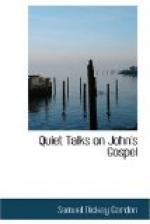It seems to take a greater use of power to restrain. “He hid Himself” is the simple sentence used. This is one of four times that we are told of His overcoming the hostile attack of a crowd by simply passing through their midst and going on His way.[98] Perhaps something in the glance of that eye of His, or in the set of His face,[99] something in Him restrained them as He quietly passes through the uproarious crowd and goes on His way undisturbed. They are held back against their wills from doing the thing they are so intent on doing.[100]
A few months later He is back in Jerusalem. But the interval seems not to have cooled their passion, only to have heated and hardened their enmity. They at once begin an aggressive wordy attack. Then losing self-control in their rage they again reach down for the stones to kill Him at once. And again they are restrained from their passionate purpose, as Jesus quietly goes on talking with them. Again they attempt to seize His person. And the simple striking sentence used, “He went forth out of their hand,” points to the extent of their purpose and to a yet greater use of His power of restraint over their unwilling wills.[101]
The last incident of this sort is the kingly entry into the city amid the enthusiasm of the pilgrim and city crowds. It says not a word about any attempt on their part nor of His restraint over them. But the very boldness of this wholly unexpected move on His part constituted a tremendous restraint. Their hate had gone through several stages of refined hardening during the few months preceding. The formal decision to kill, the edict of excommunication, the public notice that any information of His whereabouts must be made known, and the decision to kill Lazarus also,—all indicate the hotter burning of the flames of their rage.
Yet into just such a situation He quietly turns the head of His untamed unridden young colt of an ass and rides through the city surrounded by the crowds under the very eyes of these leaders and their hireling legal minions. The tenseness of the whole scene, the power of restraint so put forth, the volcano smouldering underfoot waiting the slightest extra jar to loose out its explosion, all are revealed in the little sentence so pregnant in its concealed dynamic meaning, Jesus “hid Himself from, them.” There’s an exquisite blending of restraint over them and boldness with cautious prudence. He was walking very close to the edge that time.[102]
So His power, shown so quietly but irresistibly before the eyes of all during those brief years, rises to a double climax nothing short of stupendous. Miraculous power in the realm of nature and of the human body had reached its climax in the raising of Lazarus, attested beyond question. Power over the human will both in affecting a voluntary change, and in actually restraining its action against its own set purpose, had risen to its climax in the bold open entry in broadest daylight into the capital where His death was officially and publicly decreed. The two climaxes touch. And it is tremendously significant that whereas they sometimes question His miraculous power, they could not deny His restraining power over themselves. How gladly they would if only they could.




